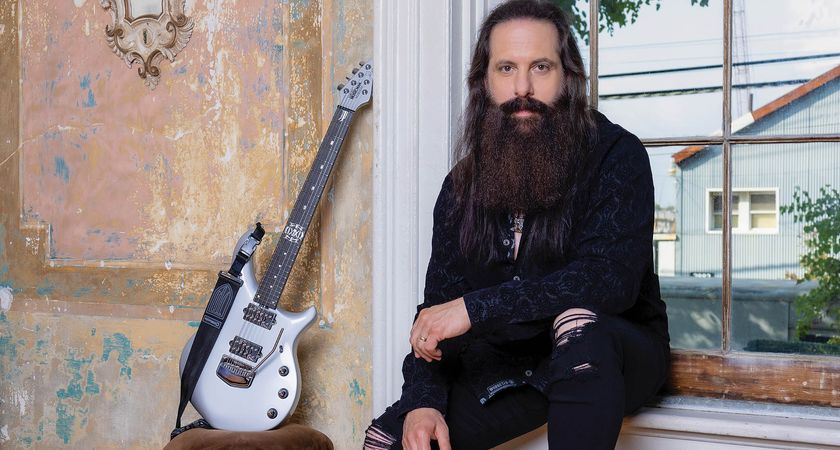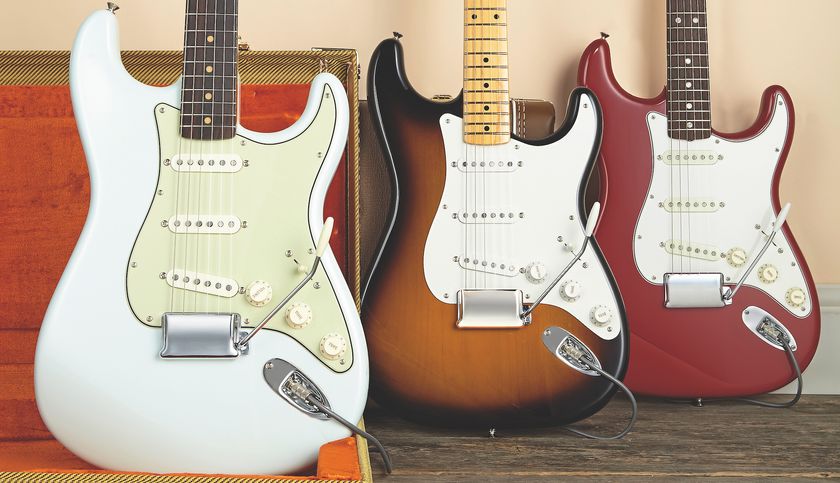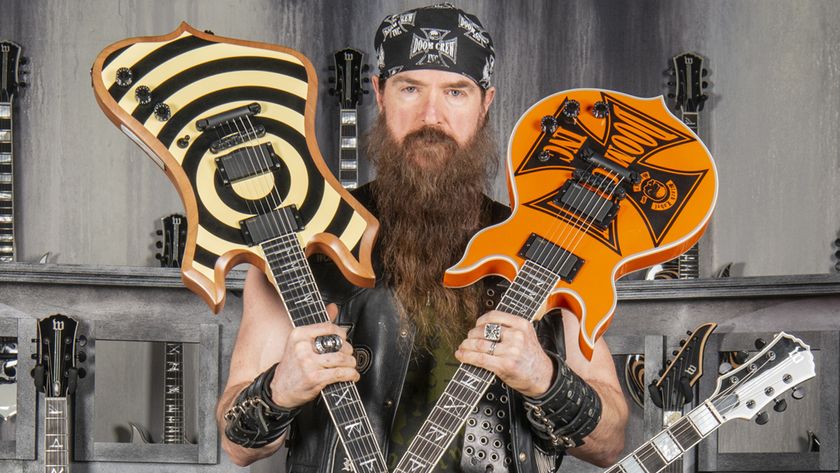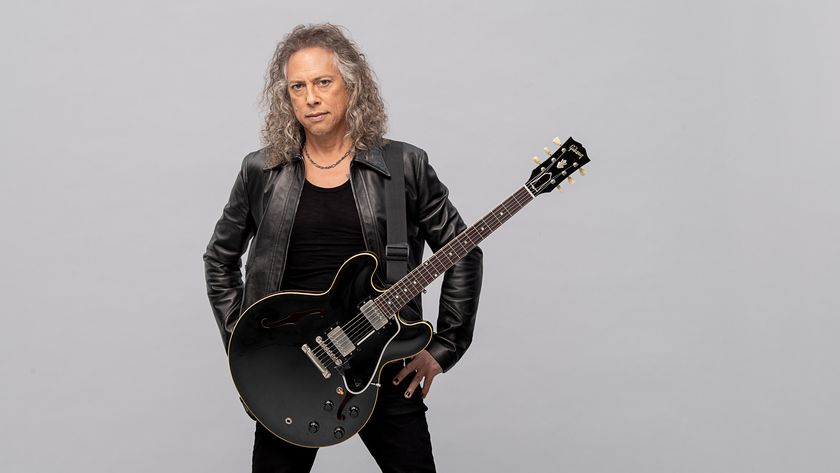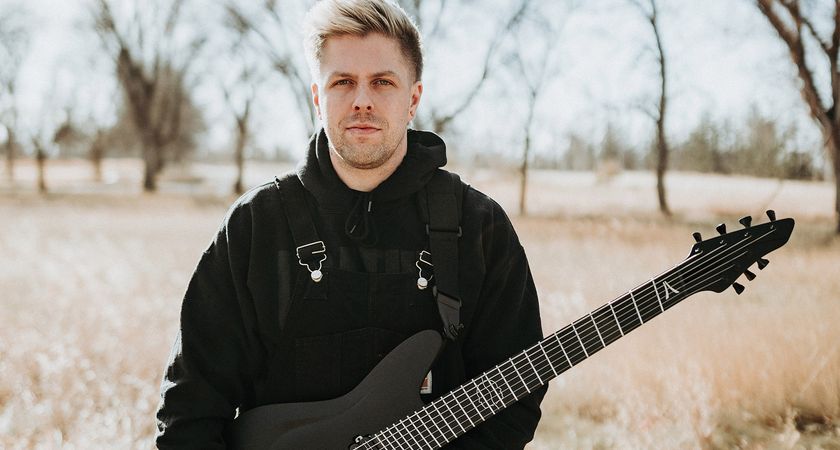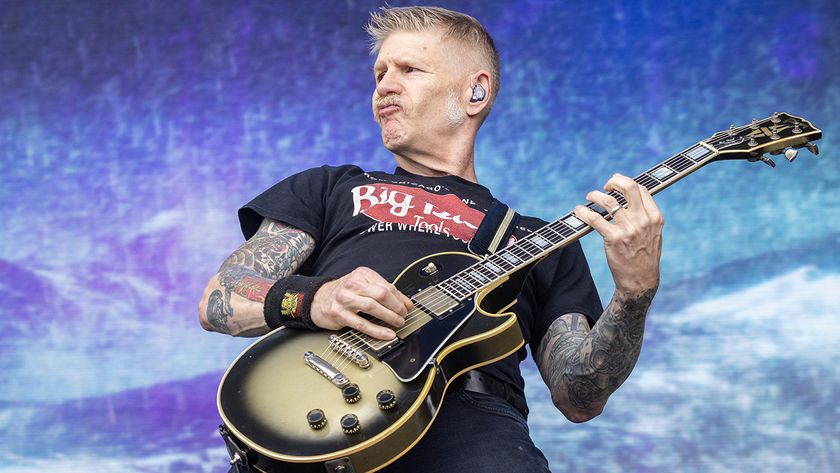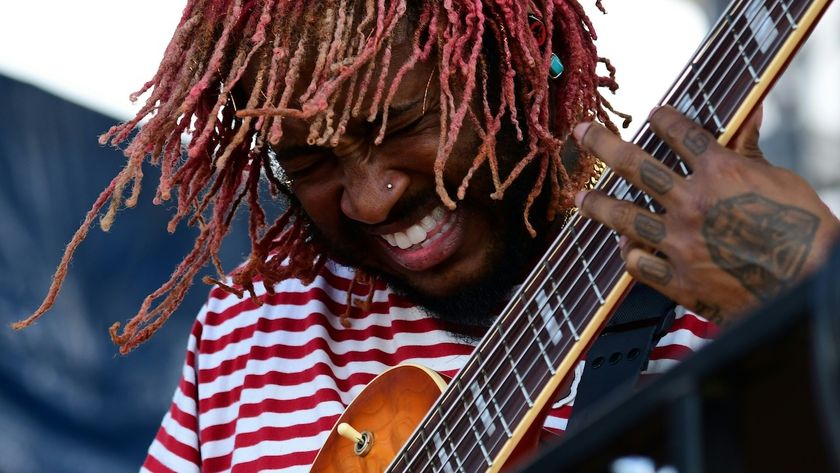“I planned to go out with Ministry. But then Madonna said, ‘I want Monte here – even if he’s just standing and holding a guitar’”: Monte Pittman on his crazy journey from Guitar Center to Ministry via Prong and Madonna – and his band with Adam Lambert
It might seem strange that a dude best known for playing guitar lines for pumping, thumping dance songs is now blowing eardrums with industrial metallers Ministry. But Pittman says he’s right where he belongs. This is his remarkable story
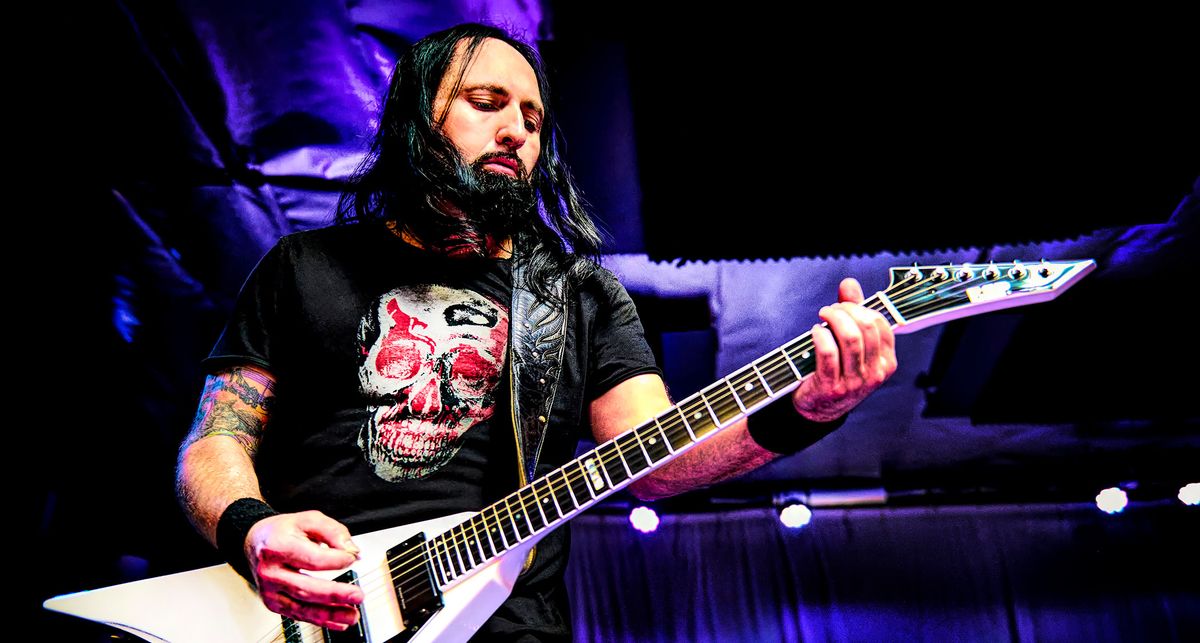
It’s a fairly well-known feel-good story that exemplifies how determination, skill and luck can take a guitarist from the dingy club scene to the greatest heights of touring success. Texas-born Monte Pittman moves to Los Angeles in 1999 and starts giving guitar lessons at Guitar Center.
One day, English filmmaker Guy Ritchie walks into the store with a Gibson J-45, and Pittman becomes his teacher. Aware that Ritchie is dating pop icon Madonna, Pittman transposes the guitar parts for her latest album Music and shows them to Ritchie. Then, as a gesture to Madonna, whose latest love song, I Deserve It, is about her future husband, Pittman teaches Ritchie how to strum the song’s chords and suggests he play it for her.
Touched by the romantic gesture, Madonna invites Pittman to her home and asks him to teach her guitar as well. Then she invites him to play guitar for her on tour. They become close friends, and she hires him to record with her in the studio. Madonna also hires Pittman to teach her kids guitar.
In 2008, after eight years of marriage, Madonna and Ritchie get divorced, but Pittman remains her go-to guitarist, whether in the studio, on the road or waiting in the wings in case she needs him to show her something on guitar. Today, Madonna is performing a mostly electronic set, and her son David Banda plays a bit of guitar, which frees Pittman up to… torch venues with industrial metal band Ministry.
For now, at least, Pittman is off the dance-pop merry-go-round and touring with Al Jourgensen and his radical gang of misfits and ne’er-do-wells, which includes Pittman, guitarist Cesar Soto, bassist Paul D’Amour (ex-Tool), keyboardist (John Bechdel) and drummer Roy Mayorga (ex-Soulfly, ex-Stone Sour).
It might seem strange that a dude best known for playing guitar lines for pumping, thumping dance songs is currently blowing eardrums with Ministry. Yet Pittman says he’s right where he belongs. “I love turning everything all the way up, and playing really heavy stuff,” he says. “It’s where I started out, and I was actually briefly in Ministry about nine years ago.”
At the time, Madonna was getting ready to release Rebel Heart and was scheduling a promotional media tour. Her management told Monte she was only performing three songs and he didn’t need to be there. “
Get The Pick Newsletter
All the latest guitar news, interviews, lessons, reviews, deals and more, direct to your inbox!
“I planned to go out with Ministry for a while until Madonna was done with the promo tour and then I would join her for the big world tour,” Pittman says. “I figured it would work out great. But then Madonna said, ‘I want Monte here – even if he’s just standing and holding a guitar.’ So I had to go back to Al and say, ‘Uh, yeah. Sorry, I’ve gotta go.’”
Anyone wondering why Jourgensen would want Madonna’s longtime guitarist to join Ministry clearly hasn’t seen Pittman in action. As he plays, Pittman is stone-faced, banging his head and swaying his full frame from side to side while buzzing power chords and chunky palm-muted notes shower from his gear like sparks from an arc welder.
Every bar of music seems to seethe with anger and resentment. But looks can deceive. In person, Pittman is soft-spoken, friendly and perpetually upbeat.
“Touring with Ministry is like being on a road trip with your best friends,” he says. “We laugh so much and have the best time.”
Given his background, it’s no wonder Pittman is right at home in the eye of Ministry’s hurricane. The guy grew up a metalhead, adoring Led Zeppelin, AC/DC, Black Sabbath and Judas Priest, which he tried to emulate at age 13 when he picked up his first guitar, a Synsonic Terminator with a built-in speaker. Then he heard Master of Puppets and Pittman’s future was cast in steel.

“It wasn’t just that the music sounded awesome,” he says. “It was challenging to play that fast without your arm feeling like it was going to catch on fire. And that only added to the enjoyment of trying to learn it.”
He formed a cover band with friends and turned songs by AC/DC, Mötley Crüe and Metallica into train wrecks. Soon after, he started taking guitar lessons with Longview, Texas, instructor Robert Browning (who still teaches Pittman through Zoom calls), and he rapidly improved.
In addition to teaching Pittman how to play tighter and more fluidly, Browning introduced the young student to blues and jazz, and Pittman fine-tuned his skills as a member of his school’s jazz band.
“What Robert really taught me is that at the end of the day, there are only so many notes and – however you play them – it’s all music. The style of music you’re playing just comes down to the setting you have on your amp or the effects you’re using. Play something one way and it might sound like surf music. Play it another way and it could sound like Slayer.”
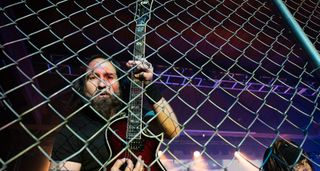
Pittman’s first band Insanity made local waves playing teen clubs in Longview. His next East Texas group, the metallic funk-punk mish-mash Myra Mains, was more accomplished and self-released two albums, including one produced by Sterling Winfield.
The band nearly got signed to a major label and planned to record at Dimebag Darrell’s studio, but the deal went sour and Myra Mains disbanded. Dismayed, Pittman moved to Los Angeles in 1999. Not two years later, he was touring with Madonna.
Since then, he has released seven solo albums, starting with 2009’s The Deepest Dark; in 2018 he put out two musically disparate records on the same day, the scathing, brutal Between the Space and the plaintive, acoustic Better or Worse. He’s fully prepared to hit the road again with Madonna at a moment’s notice, but until then, he plans to enjoy his time with Ministry, onstage and in the studio.
During an off day on the band’s sold-out headline club tour, Pittman talks about his metal roots, explains how being in Ministry requires serious math skills and reveals how he almost recorded an album with Adam Lambert. He also discusses his years with Prong, talks gear and lets us in on his future plans.
As an artist, did you have any musical revelations working on the latest Ministry album, Hopiumforthemasses?
“Al has a different kind of aesthetic and approach from your conventional pop or rock band. Working with him was like going to college. We love hanging out, and I learned so much because I stayed there with him several days a week while he worked on the album. Even when I wasn’t working on something, I would watch how he creates, which was a real education.”
What did you learn that you didn’t already know?
“Let’s say you have a riff. Imagine you’re cutting it in half or in thirds and then you track the riff that way. You may just keep one of those tracks, and that becomes your guitar part. But the important thing for him is to strip it down to its simplest form. Maybe you still build from there or maybe you leave it. But it’s like deconstructing what you’re doing and then reconstructing it from there, which is really cool.
“What I also find interesting is he’ll start with the beginning of the song. He’ll make sure he has that and then he’ll build the next part. By contrast, I generally just say, ‘Okay, here’s our chorus, here’s our verse. We’ll go verse/chorus, verse/chorus and then throw in other parts – a pre-chorus, a bridge.’”
What if you came to him with a riff you really like and think would make a great chorus? Would he hold a spot for it?
“He doesn’t think or work that way, but different bands have different ways of doing things. With Mötley Crüe, the first music you hear is the chorus, and for them it’s like, ‘Wow, yeah, that is a great idea because you hear that hook right in the beginning of the song.’
“With Metallica, the verse is not the beginning of the song. They start with a riff. And then when the vocals start, it’s like a different piece of music. For Enter Sandman, for example, there’s never any singing over that main riff. Whereas, for a Madonna song, usually the first thing you hear is what the music is going to be for the verse.”
Have there been any particular challenges you’ve faced playing in Ministry?
“Al has said that back when he wrote songs like Stigmata and Thieves, it was all about putting the audience in a trance, and that gave me a lot of trouble because he repeats the same parts over and over. I was like, ‘How many times? Is this verse six? Does this next thing happen now?’ You’re watching the crowd and playing and you lose track. ‘Wait, how many of these have there been?’ That was something I really had to get used to.”
Do you remember the first time you heard Ministry?
“When Psalm 69 came out in 1992, a friend played it for me. We were in his Saturn driving through Tyler, Texas. I said, ‘Wow, what is this? It’s pretty cool.’ And he said, ‘Dude, what Metallica was to you growing up, Ministry is to me.’ But I didn’t go out and buy the album or anything.
“It was more like the way it was with Madonna. I knew some of the music, but I didn’t own any of it. I didn’t own a lot of albums because you had to save up money and go buy an album, and I didn’t have money back then.”
After you moved to Los Angeles you joined Prong.
“When I moved there, Prong were broken up. I met their frontman Tommy Victor through a mutual friend, Ivan De Prume, who was White Zombie’s original drummer. He was jamming with Tommy for a minute, and he said to me, ‘Man, I gotta put you two together.’ He told Tommy about me. We got together, and from the first time we met, Tommy started saying things like, ‘Hey, well, we can do this. Let’s do that.’
“So I said to him, ‘Oh, does that mean I have the gig?’ I was just joking around, and he goes, ‘Well, yeah, of course!’ I couldn’t believe it. After I left, I called my friend and said, ‘Hey! I think I’m in Prong.’ They were one of my favorite bands. Snap Your Fingers, Snap Your Neck [from 1994’s Cleansing] – to me, that’s my favorite guitar sound – a Marshall JCM800 with this scooped-out contour.”
Why did you continue teaching at Guitar Center while you were in Prong?
“I wasn’t making any money. It was hard because I lived down in Redondo Beach and worked in Hollywood. And Prong rehearsed in Burbank. When I first came here I didn’t realize the distance [31 miles] and how much time that takes to drive. So I was only getting a few hours of sleep a night.”
We found this kid who was an amazing singer… But then he went on American Idol, and later he joined Queen... Adam Lambert has done pretty well since then
You played on Prong’s 100% Live in 2002, and you were on two studio albums, Scorpio Rising in 2003 and Power of the Damager in 2007. But you were also with Madonna during that time, and you played on her album American Life in 2003 and Confessions on a Dance Floor in 2005. Was it hard to juggle the two projects?
“It was okay until they started overlapping. Then I had to prioritize. When I played in Prong, there were two guitars. But Prong had always been a three-piece, so after a while, when I couldn’t play with them anymore, they went back to being a three-piece and I went back to Madonna.”
Tommy Victor played on three Ministry albums. Did he introduce you to Al Jourgensen?
“Pretty much. Me and Tommy did Power of the Damager in El Paso. Al was the executive producer, Tommy was the producer, and I was the associate producer. We all worked on the album together, which is how I met Al, and we became friends. Later, I went to see Tommy in Ministry, and everything built up from there.”
Before you joined Ministry, you and Tommy were in another band called Citizen Vein. What happened with that?
“We found this kid who was an amazing singer. It was a local band and it was me on guitar, Tommy on bass and then this kid. But then he went on American Idol, and later he joined Queen. So that didn’t happen. But that guy, Adam Lambert, has done pretty well since then.”
What kind of a name is Citizen Vein? And was it a metal band?
“We just needed a name to put in LA Weekly, and we couldn’t think of anything. I think Adam’s dad came up with it. The band was more rock than metal. I brought in the garage rock influences of bands like the Hellacopters, and Adam brought his voice. Tommy was on bass and Madonna’s drummer – at the time – Steve Sidelnyk was playing with us. But we didn’t do much. There are barely any recordings of us, and whatever’s out there is just us jamming.”
What kind of gear do you use onstage right now with Ministry?
“I take my white ESP V and Eclipse guitars on tour. Cesar’s playing a white V and Paul has a white bass. We figured that since the album cover was white, we’d play white guitars, but it worked out well. I use a Kemper with the [Captor X IR from the Two Notes Audio Engineering Ministry DynIR Hot Rod Cabinet collection], and that goes into an Emperor guitar cabinet front of house.
“My cabinet is my monitor, and I don’t use ear monitors or earplugs. If we’re playing something from The Mind is a Terrible Thing to Taste like Thieves or Burning Inside, I’ll use a profile of a Silver Jubilee because that’s what they used on the album. And for Psalm 69, I’ll use a Marshall JMP-1.
“Or if we’re doing something from when Tommy was in the band, I use a Krank setting because I think Dimebag gave him some Krank amps. I try to get as close to what was used on the albums as possible and then I tweak it as I go along. The Kemper is versatile that way.”
Does Cesar also use a Kemper?
“No, he’s using a Quad Cortex, but he uses the power section of his amp and it’s massive-sounding. It’s similar to how [Exodus and Slayer guitarist] Gary Holt runs his amp and you hear those tubes.”
How do you and Cesar play off one another?
“We both lock in with the drums and play. We don’t have a set template like, ‘If you go here, I go here.’ He does a lot of up and down picking, and I’ll do a lot of downs. But if I’m playing something that he wrote, I’ll do more picking in his style so everything fires in the same way, which makes everything tighter.”
In May, Ministry played a set at the Cruel World Festival in Pasadena and played exclusively songs from the band’s 1983 synth-pop album With Sympathy, which Al Jourgensen has called a “sonic abortion” and the 1986 industrial dance album Twitch, which spawned the band’s first hit, Stigmata, which Jourgensen has also viciously bad-mouthed. Did Al lose a bet or receive an offer he couldn’t refuse?
“It was just something Ministry had never done before, and I think that appealed to everyone. We all brought in ideas for the songs to make them more interesting, and I think that helped inject them with new life.
“I had some totally different ideas for the pop guitars because that stuff is so second nature to me and I didn’t know the songs the way the band originally did them. Sometimes, I’d go into something thinking, ‘Okay, I know Al hates this song. Let me do something different with it that might make him like it.’”
In 2018 you released two wildly different solo albums on the same day. Do you have any plans to release more solo material?
“There are so many projects I would like to do. In a perfect world, I’d like to release 10 albums in one day, but I don’t know who is gonna ever let me do that. There’s acoustic stuff I wanted to do. There’s heavy stuff I’ve got. I’d love to do a covers album. I’d love to do a blues album, a jazz album, an EDM album, a surf album.”
Do you like to sit down and write a batch of material in one particular genre to try to meet that lofty goal one project at a time?
When I found out Al really hated With Sympathy, I went and re-did the whole album by myself just to try to figure out what he doesn’t like about it
“I had a student who really wanted me to teach her how to play surf guitar. That inspired me to sit down and write some songs for her to get a feel for the music and to play along to. And I wound up doing a whole album. I’ve had friends tell me it’s the best thing I’ve ever done. And sometimes I’ll give myself a project just because I’m curious about it or I want to try to figure something out.
“Like, when I found out Al really hated With Sympathy, I went and re-did the whole album by myself just to try to figure out what he doesn’t like about it. And listening back to it, I could see where the producer or label made him do the songs in a certain way to try to make them more commercial.
“From touring with Rob Zombie and hearing those songs every night, I would pick up my guitar and purposely play something that sounded like a Rob Zombie song just because I had listened to it so much. But from doing that you can learn a lot about different styles and approaches to things. It can be challenging as well, and I like to challenge myself.”
- Hopiumforthemasses is out now via Nuclear Blast.
Jon is an author, journalist, and podcaster who recently wrote and hosted the first 12-episode season of the acclaimed Backstaged: The Devil in Metal, an exclusive from Diversion Podcasts/iHeart. He is also the primary author of the popular Louder Than Hell: The Definitive Oral History of Metal and the sole author of Raising Hell: Backstage Tales From the Lives of Metal Legends. In addition, he co-wrote I'm the Man: The Story of That Guy From Anthrax (with Scott Ian), Ministry: The Lost Gospels According to Al Jourgensen (with Al Jourgensen), and My Riot: Agnostic Front, Grit, Guts & Glory (with Roger Miret). Wiederhorn has worked on staff as an associate editor for Rolling Stone, Executive Editor of Guitar Magazine, and senior writer for MTV News. His work has also appeared in Spin, Entertainment Weekly, Yahoo.com, Revolver, Inked, Loudwire.com and other publications and websites.
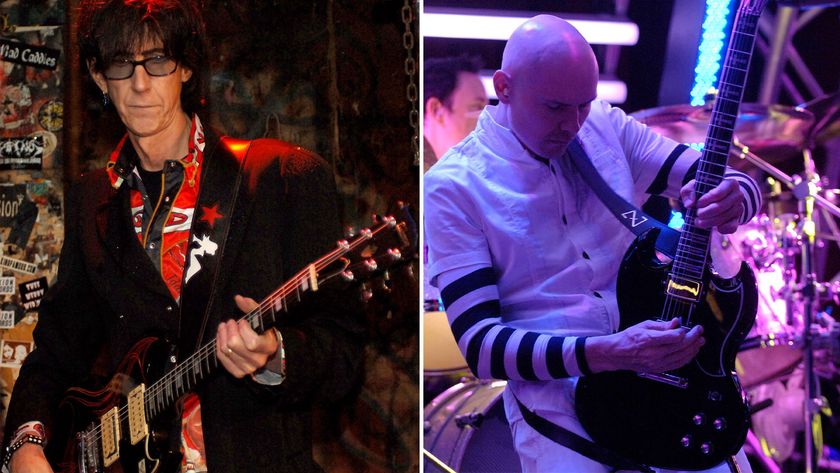
“He fell in love with my SGs, so now I have to buy him one. I told him that one day it would show up at his door”: Looking to take his post-Cars career in a more guitar-heavy direction, Ric Ocasek formed an unlikely partnership with an alt-rock icon
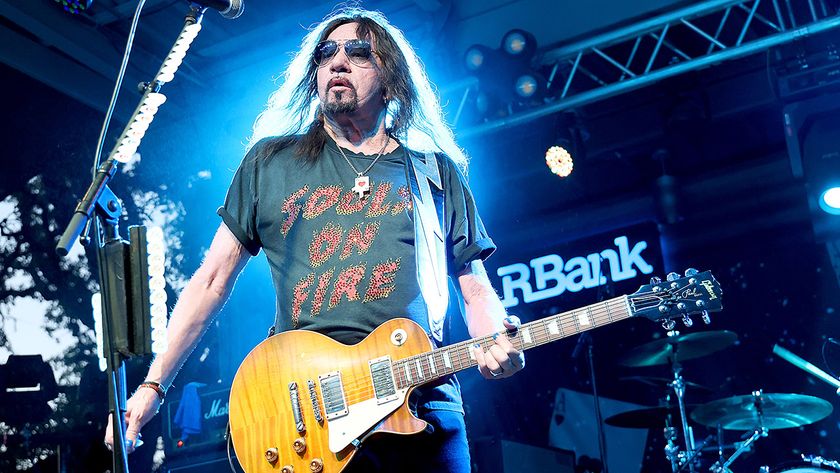
“I’m about 85 or 90 percent there. But it’s that 10 percent that sets me off. I can’t knock out those old solos as smooth as I used to”: Ace Frehley is practicing more than ever as he keeps his demons behind him and returns to arenas









